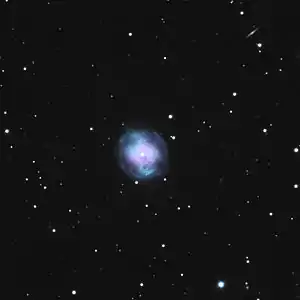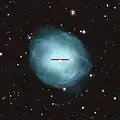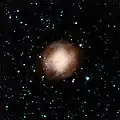| Emission nebula | |
|---|---|
| Planetary nebula | |
 NGC 4361 imaged with a 24-inch telescope | |
| Observation data: J2000 epoch | |
| Right ascension | 12h 24m 30.8s[1] |
| Declination | −18° 47′ 5.6″[1] |
| Distance | 3,377.2±153.6[1] ly |
| Apparent magnitude (V) | 10.9[2] |
| Apparent dimensions (V) | 1.3' x 1.3'[2] |
| Constellation | Corvus[3] |
| Designations | NGC 4361, PN G294.1+43.6 |
NGC 4361 is a planetary nebula in the constellation of Corvus.[3][1][2] It is included in the Astronomical League's Herschel 400 Observing Program.
Central star
NGC 4361's central star is an extremely hot [WC] Wolf-Rayet type star. Its temperature is at 270,000 K,[4] hotter than every classical Wolf–Rayet star known, and it is the hottest known non-neutron star. It is nearly 18,000 times brighter than the Sun, but is only 6.1% its size. This star left the asymptotic giant branch between 5776 and 8018 years ago.[4]
Gallery
 NGC 4361 with legacy surveys
NGC 4361 with legacy surveys NGC 4361 imaged in infrared by the Spitzer Space Telescope
NGC 4361 imaged in infrared by the Spitzer Space Telescope
References
- 1 2 3 4 "NGC 4361 -- Planetary Nebula". Simbad Astronomical Database. Universite de Strasbourg. Retrieved 6 May 2019.
- 1 2 3 "Planetary Nebula NGC 4361". Telescopius. Retrieved 6 May 2019.
- 1 2 Stefan Rumistrzewicz (1 November 2010). A Visual Astronomer's Photographic Guide to the Deep Sky: A Pocket Field Guide. Springer Science & Business Media. pp. 158–. ISBN 978-1-4419-7242-2.
- 1 2 González-Santamaría, I.; Manteiga, M.; Manchado, A.; Ulla, A.; Dafonte, C. (2019-10-01). "Properties of central stars of planetary nebulae with distances in Gaia DR2". Astronomy & Astrophysics. 630: A150. arXiv:1909.04601. Bibcode:2019A&A...630A.150G. doi:10.1051/0004-6361/201936162. ISSN 0004-6361.
External links
 Media related to NGC 4361 at Wikimedia Commons
Media related to NGC 4361 at Wikimedia Commons
This article is issued from Wikipedia. The text is licensed under Creative Commons - Attribution - Sharealike. Additional terms may apply for the media files.